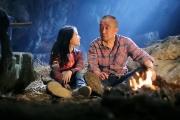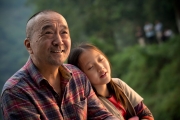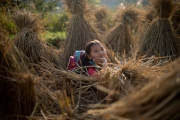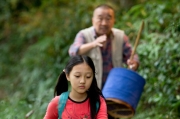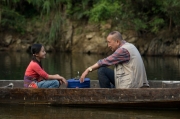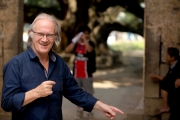Synopsis
For more than twenty years, Quan, an old Chinese farmer, has lived alone in Beijing where he moved to allow his son Kun to attend the university. To honor the promise he made to his now deceased wife, he decides to make the long return journey from Beijing to his native village Yangshuo to bring back the bird that has been his only companion during his years away from home. He is asked by his daughter-in-law Chan to take along his granddaughter Wei, an only child brought up in the lap of luxury. While grandfather and granddaughter set out on their journey – one travelling back in time, the other discovering her roots, Kun and Chan ponder the meaning of the life they have led in the sole pursuit of success and money.
Credits
Director: Philippe Muyl
Screenplay: Philippe Muyl
Producers: Ning Ning, Qin Hong
Paul Delbecq, Steve René
Cast
Li Bao Tian • Li Xiao Ran
Qin Hao • Yang Xin Yi
Schedule & Presentation
![]() Presentation by and discussion with director and screenwriter Philippe Muyl
Presentation by and discussion with director and screenwriter Philippe Muyl
More information
Choose a picture to see the filmography (source : IMDB)
![]()
How did the idea of creating such an out of the ordinary project come from?
It was not me who had the initial idea. My film The Butterlfy, which I directed in 2002, has had a huge success in China, as well as its theme song; the composer Nicolas Errera reported to me that he even caught Jackie Chan humming the song!
I was not aware of this improbable popularity. I only heard of it after attending the French Film Panorama in Beijing in 2009. There, I met Steve René, a French fan of cinema married to a Chinese woman, who asked me if I would be willing to embark on a Chinese cinematographic adventure. I replied that it was a strange question since I knew nothing about the culture. And then, the idea gained ground, I met Steve’s wife, Ning Ning, who had been an actress and TV presenter and we started talking about this project remotely.
Initially, we envisioned a remake of The Butterfly, but I realized that it was a bad idea. First, I did not really want to do a remake, but also, I knew that butterflies do not have a strong symbolic meaning in China. So I opted for an original screenplay, even if it meant having to immerse myself in a culture that I did not know.
It is such an atypical project! The apprehension of filming in a country so remote from our culture never affected your decision?
When the project was proposed to me, and I thought to myself that I would have to direct actors in a language I did not understand, I should have, reasonably, declined the offer. But I really wanted to live a human adventure totally new for me.
I took intensive Chinese classes, I read a lot and I spent extensive periods of time there, to become completely permeated by the country. Because, such a film cannot be made with preconceived ideas: the only approach that seemed possible was to be like a sponge and draw inspiration from judo philosophy! In other words, in my encounters with people, I did not try to force my way, but to use the energy I was getting from my interlocutors. Today, I realize that I thought I was climbing up a mountain, but in fact, I was actually making a big jump into the void.
So, you began learning about China by continuously visiting the country?
Yes, and I started by spending time in Beijing. Steve was my “guide”: it was an excellent open door for trying to read the Chinese society. I was first struck by the utter contrast between the display of wealth and money by certain people and the deprivation of those who have nothing. But what surprised me the most is the astounding acceleration of time. In less than thirty years, Chinese society has made a spectacular jump ahead. This is what is shown in the film over two generations: while the grandfather was a peasant who lived through the Cultural Revolution, his son has become a very successful architect. And for the granddaughter, who personifies the third generation, she is a high-tech spoiled child. It is thus a concentration of history which spread over one hundred years during the industrial revolution in the western civilization but only took less than three decades in China!
How did the writing go?
While I was there, I wrote a first draft around the idea of an elderly man who returns to his village to bring back the bird that his now dead wife had given him. Ning Ning read and translated it, and then I did an extremely detailed analysis of the script with a Chinese writer, referring to all the issues: in China do people say hello by shaking hands? What sort of gestures do they use? What are the codes? And so on. For example, I wanted there to be some tension between father and son for theatrical reasons. But I was explained that in China a son respected his father too much to openly quarrel with him. This is the legacy of the Confucian philosophy which imposes respect for elders. At the end of the work meeting, I told my assistant, who also served as my interpreter, that I did not understand. She told me that she herself was not in speaking terms with her father, but without being in conflict with him! So, when the grandfather commits a major mistake that could have put his granddaughter in danger, the father stops speaking to him, but without confronting him. Suffice to say, the writing took a long time.
How did the characters come up?
The grandfather, played by a comedian whom I met before writing the script, is a former peasant from a small village in southern China. In the film, he came up to Beijing to accompany his son and open opportunities for him, but, like many people living in rural areas coming to the capital, he had to work at the factory and sacrifice his life for his son to have a good education. For a man like the grandfather, it is important that the next generation gain access to a better life.
His son makes a big social jump without a second thought. He is a brilliant guy who benefited from the full growth of the country; famous and talented, he is drawn into a job that requires him to travel around the world. He is married to a pretty woman who is also wrapped up in her profession. The couple is therefore highly engaged in a fast moving race, which perfectly represents the excesses typical of this extremely wealthy social class. No wonder they live in an apartment worth more than 2.5 million euros which is located in a trendy neighborhood of the capital.
But for me, the little girl is the character the most emblematic of this evolution in the development of Chinese society. Contrary to her father and grandfather, she does not know her history anymore and she is, so to speak, acculturated.
Can we say that this is a story of initiation?
It is a journey to one’s roots: the grandfather revisits his past, while his granddaughter discovers her background. There is therefore introspection during the journey which indeed has an initiatory character: the little girl discovers her deepest identity, which will change her forever. For me, the characteristic of an initiatory journey is to bring you back to your inner self.
You mention a broken family who lost the habit of conversing and relearns to communicate…
When the son rekindles his relationship with his father, the tension he feels towards his wife disappears. In this way, the film is very Chinese because the Chinese are obsessed with the idea of harmony and that family is emblematic of harmony. The little girl discovers not only her roots but becomes an intermediary through which the family reunites.
Throughout the movie, you paint a portrait of contemporary China that differs from most of the ones Chinese cinema gives us.
Reality has always multiple facets. There is no doubt that Jia Zhang Ke’s China is real, but the China I show, with a different gaze, is equally genuine. The couple is real, the sets are real, and the relationships with the girl are real. So these characters are of great accuracy: they are neither fantasized nor caricatured, but directly inspired by a reality that I have been confronted with. Chinese filmmakers, for their part, want to make a critical portrait of their society, something I would not have allowed myself to do.
In the film Beijing is presented as a glass and steel, highly modernistic metropolis.
That is true, even if it is in a way more patent with Shanghai, where modernity is more controlled. In Beijing, there is no architectural coherence: like, who will build the highest and most impressive tower? I am passionate about architecture and I chose a few sites in line with my demonstration. What I show in my film, is therefore my personal view of the city. Nonetheless, the apartment is as such and provides the view that you discover in the film.
One discovers a country of striking beauty which, here again, is hardly seen in contemporary Chinese films.
I did not feel it was right for me to take a critical look at the country, but I wanted to propose a thought. To the Chinese audience, I wanted to say «Do not forget that you have a beautiful country. Try to preserve it. » And in regards to the French, I wanted to testify that China does not only come down to pollution, junk food and exploitation of people in factories, but that it is also a magnificent country with sublime natural sites.
How did the casting go?
In whole, I am delighted to have had the chance to meet the four main actors because the film owes a lot to the quality of their acting. Not only did they know that they were working with a director who did not speak their language, but they also adapted to the French acting approach in using more moderation because Chinese comedians have sometimes the tendency to inflate pathos.
The grandfather is played by Li Baotian, an acclaimed comedian in China seen in films by Zhang Yimou and who works a lot for television. For the mother, I chose Li Xiao Ran who does not have the notoriety of other stars, but because I liked her spontaneity and beautiful simplicity. I can work only with people with whom I get along well, on human terms.
As for Xin Hao who plays the part of the father, I had discovered him in Mystery by Lou Ye.
I met him at the very beginning of the casting, before seeing other more known comedians, and then I came back to him.
For the grand-daughter, I interviewed a lot of children and then I had the chance to discover that kid who met all my expectations. In real life, she is adorable, hard-working and intelligent. And above all, she and Li Baotian got along wonderfully.
Finally, I called on about ten non-professionals whom I found sometimes ten days before shooting, as was the case for the toothless old man with whom the grand-father reunites in the village. I took risks because I am not used to working with non-professionals. But they were not at all inhibited; on the contrary, they acted with great accuracy.
How does one manage to direct actors in a language in which one does not have any markers?
I got used to the musicality of the language which is extremely dynamic, so much so that I felt certain closeness toward it, even if I did not understand the meaning of the exchanges. When I see the film today, I wonder sometimes by what miracles there was no accident with the dialogues, Frankly, I do not know how we managed! (laughters) All the more so as we shot the film in direct sound, with exception of two post synchronized replicas, with a French sound engineer who did not speak Chinese either. . .
Of course, I relied on my translators to whom I was constantly asking if such or such sentence was correctly pronounced. But I “cover” myself in shooting an enormous number of takes in order to have a maximum of material for the editing phase. I owe a lot to the actors who, very often, spontaneously offered to reshoot a take. What delighted me is that Chinese viewers told me that the film as a whole was of great accuracy.
The Chinese authorities did not require some concessions from your part?
Even if people would love for me to complain about censure –which is a real problem for the Chinese–, I must say that going to China, I inevitably accepted the “moral contract” and the constraints attached to my project. But with this specific movie, totally a-political, I was not exposed to the wraths of the Chinese censure. Yet, I did not try to write either a “smooth’ scenario. I only had to shorten the length of the waiting time of the passengers of a broken down bus in order to show the good running of the country system. That was not too bad…
Several takes seem to be captured live, almost with hidden cameras…
Absolutely. The advantage in China is that there is no image rights ! (laughters)For example, in the city of Yangzhou, we managed to weave in the crowd to shoot the newlyweds’ car, the strolling bystanders with balloons of all colors, or the traders on the road side – China is such a photogenic country: the colors, the substances, the architecture are simply magnificent. Moreover, I am very attentive to framing and composition. But one must admit that the textures, the tonalities, the country’s geometric forms facilitate the work on composition. I worked with a fantastic Chinese cinematographer who did not have though a great amount of experience.
Why did you call upon music composer Armand Amar, who is very remote from the Chinese culture?
He is remote from Chinese culture but not from traditional ethnic music. Anyway, I did not want the music to be too prevalent, I was looking for an elegant score. I therefore told Armand that I did not wish for “Chinese style music”, and not to resort to erhu, the traditional cord instrument. What appealed to me is that Armand’s music presents a rather discrete melodic line, which contributes to the film’s poetic atmosphere.
The post production took place in France.
Yes because I wanted a refinement that I would not have obtained in China. For example, in China, the technician who edits the film is a processor who works under the director’s orders. Yet, I wanted a film editor in the French sense of the word, that is to say someone who will bring us a critical and artistic perspective.
How did the production of the film go?
It is only the second official co-production between China and France, and the first one by a French director. For that matter, I do not believe that a non-Chinese director had ever shot a film in China before this project. Very few films were ever undertaken with such production risk. The French and Chinese investors largely contributed from their own pocket, without the help of the CNC (Centre national du cinéma et de l’image animée). In the end, this film is the result of an extraordinary commitment: our Chinese and French partners demonstrated an exemplary tenacity.



